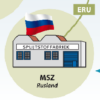 Yesterday, the ANVS, the Dutch nuclear supervisor, authorized the
Yesterday, the ANVS, the Dutch nuclear supervisor, authorized the
transport of up to six shipments of fissile enriched uranium from Russia to Urenco in Almelo. This is remarkable because after the Russian invasion, almost two years ago, the uranium-enriching state-owned company in Almelo claimed to be "very concerned" about developments in Ukraine and therefore "stopped all contracts" with Russia.
Local newspaper Tubantia now reports that Urenco is enriching uranium from Russia for "a French nuclear power plant operator." It would, according to a Urenco spokesperson, be a breach of contract not to do so.
The ANVS yesterday granted three permits for the transport of enriched uranium from Russia to Almelo. One permit for 120 small uranium samples, one for 24 empty uranium containers, and one for 24 containers filled with fissile enriched uranium.
According to the Urenco spokesman, in Tubantia, the route of the uranium from France is via Russia, because the uranium must first be converted into uranium hexafluoride (UF6) in Russia before it can be further enriched by Urenco. The license talks about "unirradiated" uranium, but since French EDF has a lot of reprocessed uranium, and Rosatom, the Russian state-owned nuclear energy company, is the only party converting reprocessed uranium to UF6, Laka assumes that this shipment involves reprocessed (irradiated and processed) enriched uranium. It is remarkable that EDF then apparently chooses to let Urenco re-enrich this uranium. After all, why don't they let Rosatom do that in one go?
Something similar was going on in the late 1970s: Urenco was enriching uranium from South African-occupied Namibia. Urenco defended itself by arguing that one did not own the uranium, it was supplied by the customer and one could not see where it came from. One was merely providing a service by enriching it. The United Nations disagreed: if you can suspect that something is stolen, you are a fence if you earn from it. In 1985 the UN announced a lawsuit against the Netherlands (as owner of Urenco NL), but it was dropped when Namibia became independent.
But the message was and is clear: in addition to a contractual one, there is also a moral component to doing business. And Urenco seems to forget that here (again).
But before we lose ourselves in technical reflections of that kind, it is really and above all a great affront that Ad Louter, the director of Urenco Almelo, chairman of the nuclear lobby organisation Nucleair Nederland, first claims with much aplomb to have 'stopped all contracts with the Russians' and then that after two years it turns out that uranium is being enriched in Russia after all.
Does that remind us of anything? Indeed: EPZ, the operator of Borssele nuclear power plant also claimed to "no longer do any direct business with Russia." After which it turned out that Borssele actually does depend on the same Russian supplier that Urenco does business with.
And the Dutch government knew about this al along. Because upon re-examining the answers to GroenLinks' parliamentary questions from April 2023, about this:
6. The members of the GroenLinks Group further understand that after the Russian invasion of Ukraine, Urenco terminated all its contracts with service providers in the Russian Federation. [...]
Reply Secretary of State for Infrastructure and Water Management
Immediately after Russia's invasion of Ukraine, Urenco terminated its contracts with Russian parties. There have been no direct ties between Urenco and Russian parties since then, nor any open transactions or shipments.
Urenco was caught because the ANVS issued transport licenses from Russia. "But given the many shipments and permits, it is quite possible that Urenco never actually stopped enriching uranium from Russia," said Dirk Bannink, from Laka Foundation. "Because those 24 empty containers coming from JSC Siberian Chemical Plant at Seversk, I guess that's also not for charity."

